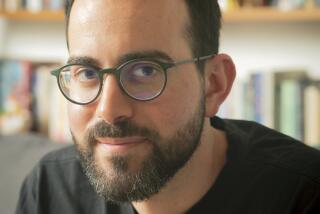We’ve Moved Up a Bit From the Center of the Universe
- Share via
The entire history of science, it often seems, is one long lesson in humility.
From our privileged spot at the center of the cosmos (or so we thought) just a few hundred years ago, we fell into the arms of a very ordinary spiral galaxy, one of billions in the universe. Our solar system, astronomers tell us, congealed out of debris of long-dead stars the way fat congeals in soup.
To rub it in, cosmologists now tell us that even the universe may be nothing special--just one of a very large litter of universes that may well breed like bunnies.
It’s even possible, some physicists say, that we experience only a small sliver of the true spatial dimensions of space--like pond scum confined to the surface of a much deeper universe, whose depths we will never fathom.
Physicists and astronomers are mostly to blame for this humiliating state of affairs.
But biologists have certainly done their share. Is it any wonder that the Kansas state school board couldn’t stomach Darwin’s lesson that we’re all descended from hairy, small-brained hominids? Teenagers aren’t the only ones embarrassed by strange-looking parents.
But, as the late biologist Lewis Thomas put it, the situation is far worse even than that. We can now trace our ancestors back to bacteria: “We go back to it [rather than them],” he wrote in the preface to biologist Lynn Margulis’ delightful book “Microcosmos.”
Microbes, Margulis said, not only rule the Earth, they rule us as well. Fully 10% of our dry body weight consists of bacteria. We depend on them for digestion, among other things. In a very real sense, they invented us for their own purposes, as warm salty environments in which to breed and prosper.
Life has been around in simple form for more than 3.5 billion years; the entire history of humanity accounts for less than 1% of that. Even now, we don’t amount to much. There are nearly a million species of insects, compared with a paltry couple of thousand species of mammals.
Lest you think we’ve become somehow separate, superior, to all of this, consider: We still share 50% of our genes with fungi. In early gestation, a human embryo is all but impossible to distinguish from that of a pig, ox or rabbit.
And what about plants? Without them, we would not only go hungry; we wouldn’t be able to breathe. If all photosynthesis ceased, the oxygen in Earth’s atmosphere would be mostly gone in less than a million years.
Even dumb rocks show us up, rattling and rolling us out of our beds at the slightest provocation--whenever one continental plate rubs its neighbor the wrong way.
Chemists, in the last analysis, are probably the worst. Lust, fear, hate, even spiritual enlightenment--all our emotions boil down to disembodied dances with molecules. Our most profound thoughts are nothing but neurotransmitters blinking messages to each other inside the blackness of our brains.
In fact, cognitive scientists, following Freud, tell us that only a very small percentage of our thoughts even surface to the level of consciousness--meaning that most of the time, we don’t even know what we think!
It’s almost as if nature has set out to reward those who would learn her secrets with a single, all-encompassing lesson: You don’t amount to a hill of beans.
But there’s another way of looking at this. In some sense, we are more central, more powerful, than ever.
When people were seen as sitting at the center of the cosmos, they also were at the bottom of the heap. Human beings were the powerless and imperfect playthings of all-knowing, all-powerful gods who controlled everything from plague and pestilence to the course of weather and love affairs. The heavens revolved above and beyond on precision-crafted crystal spheres, forever beyond our sullied reach.
Today, we know we are formed from the same stuff as stars. We are a piece--not separate--from this grand, entangled cosmos. And we control--at least to some extent--our destinies.
More impressive still, our brains have learned to spin space-time into black holes and to tame quantum unruliness to operate computers. On good days, we even have the mind to appreciate the grandeur of it all--setting it to music, or art, or equations.
Along the way, of course, we’ve also learned enough to allow us to destroy much of it without the help of any gods at all. This, in itself, is an awesome sort of power.
So it’s not entirely clear whether the discoveries of science have really made us more humble. But they have certainly, as the late physicist Frank Oppenheimer put it, “changed the nature of our humility.”
*
Cole can be reached at k.c.cole@latimes.com





